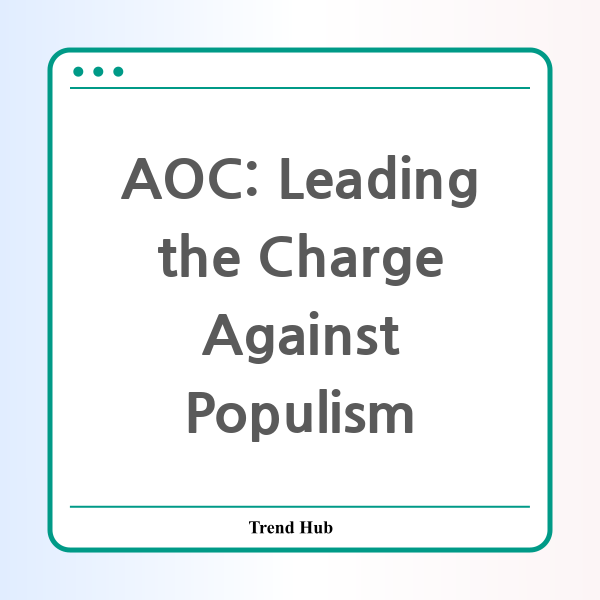* This website participates in the Amazon Affiliate Program and earns from qualifying purchases.

The future of populism in America appears to be heavily influenced by the rising figure of Alexandria Ocasio-Cortez (AOC) alongside veteran politician Bernie Sanders. As frustration mounts among liberal voters regarding the Democratic Party's perceived complacency, these leaders are harnessing that anger into a powerful movement aimed at fighting back against oligarchy and authoritarianism. But can they truly combat populism with a brand of their own?
This question resonates deeply, especially following the recent "Fighting Oligarchy" rally in Los Angeles that drew an astounding crowd of 36,000 people. The atmosphere was charged with a palpable mix of joy and anger, as Sanders and AOC painted a vivid picture of the struggles facing working Americans—a stark contrast to the increasingly elite perceptions of the Democratic Party. Ocasio-Cortez's rallying cry, urging support for Democrats willing to fight for the people, stressed the need for authentic representation in politics.
The rally was not just another political event but a cultural phenomenon, often likened to a musical festival complete with performances from prominent artists like Neil Young and Joan Baez. This festive approach to activism lightened the mood and made political expression accessible, engaging a younger audience who might feel disenfranchised by traditional political rhetoric.
Despite the entertaining components, the messages delivered were serious and direct. The leaders addressed the serious threat posed by figures like Donald Trump and Elon Musk, who they believe epitomize the growing divide between the wealthy elite and everyday Americans. Sanders, in particular, pointed out the stark reality of wealth inequality, reminding attendees that billionaires possess more wealth than half of the American population combined. This notion of oligarchy, where money flows freely into politics, creates an environment where ordinary citizens feel powerless and unheard.
As AOC shared her experience within Congress, she highlighted how deeply ingrained corporate money has become in American politics, painting a troubling picture of a system rife with conflicts of interest. This candid portrayal of political dynamics resonates with many disillusioned voters who believe that their concerns fall on deaf ears, fueling a desire for a different kind of political leadership.
The rally also captured a broader sentiment of frustration and urgency among constituents. Attendees expressed feelings of shock and disillusionment with the political system. Many feel abandoned by leaders who seem more interested in maintaining the status quo than enacting real change. This growing dissatisfaction could spell trouble for traditional Democrats who fail to connect with the grassroots base that once formed their foundation.
As the political landscape shifts, Ocasio-Cortez represents a new generation of leaders who prioritize authenticity and directness over polished political correctness. Campaigns that utilize genuine grassroots movements can generate considerable traction as voters seek leaders who address their real concerns. In light of this, the question arises: can populism, when wielded authentically, become a unifying force against the toxic elements of authoritarianism that threaten democracy?
Indeed, AOC's ability to capture the hearts of younger voters and engage a diverse coalition is pivotal in reshaping the political narrative. It may be that her bond with Sanders, who has been a steadfast figure in advocating for economic equality and justice for decades, will serve as a catalyst for mobilization in the run-up to future elections. Together, they aim to ensure that the voices of the many, rather than the few, are prioritized.
In conclusion, the events at the "Fighting Oligarchy" rally signal that populism in America may evolve into a more inclusive and socially aware movement, one spearheaded by passionate leaders committed to genuine change. Ocasio-Cortez and Sanders are not just challenging the status quo; they are redefining what it means to fight for democracy in today's America. As they continue to challenge both Republican and complacent Democratic narratives, their influence could very well shape the political horizon for years to come.
* This website participates in the Amazon Affiliate Program and earns from qualifying purchases.